AWM41 975 - [Nurses Narratives] Principal Matron Ellen Julia Gould - Part 2
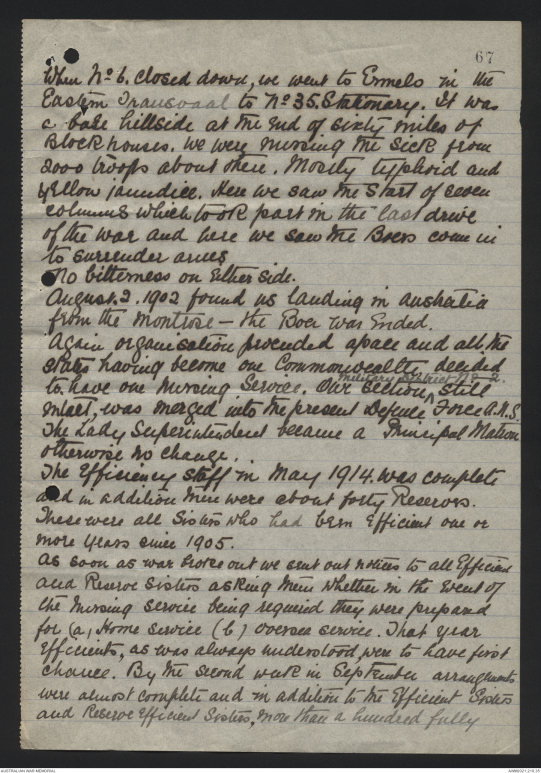
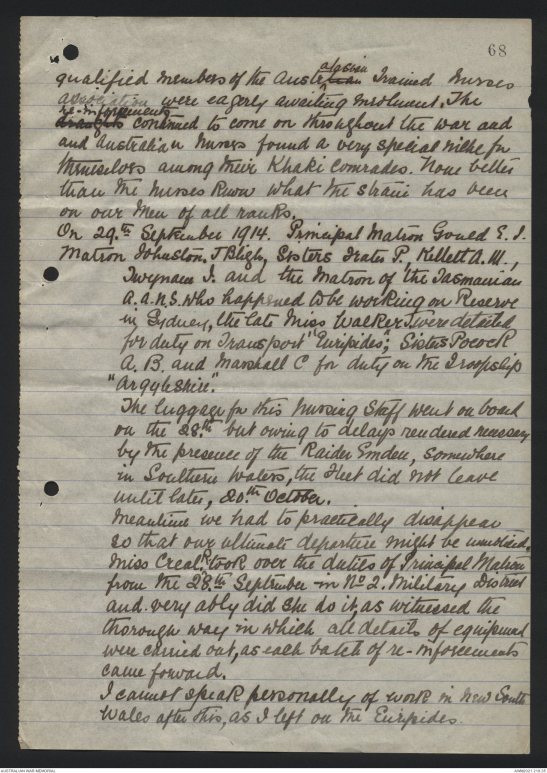
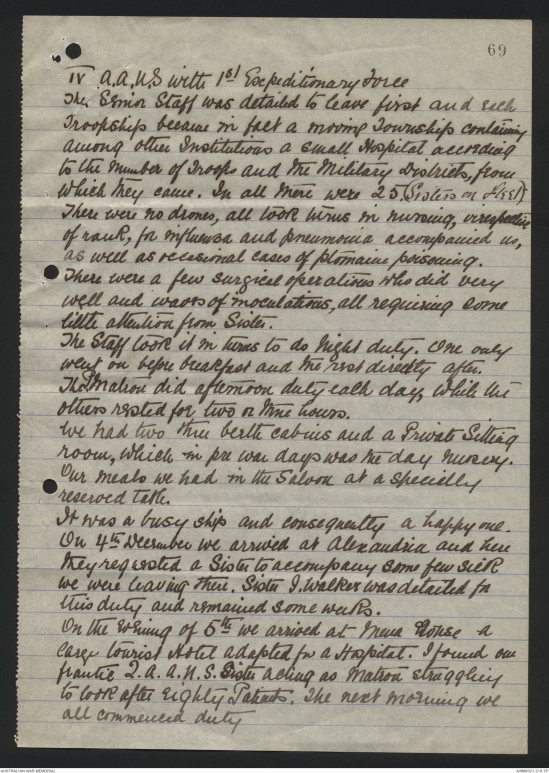
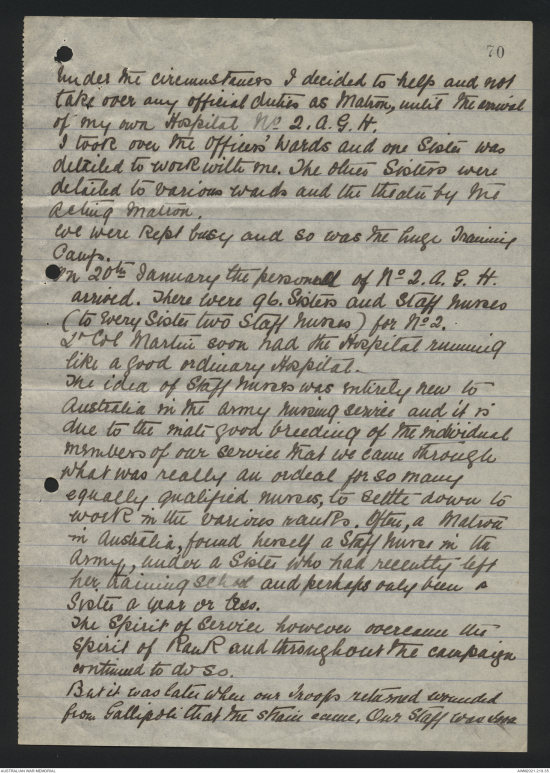
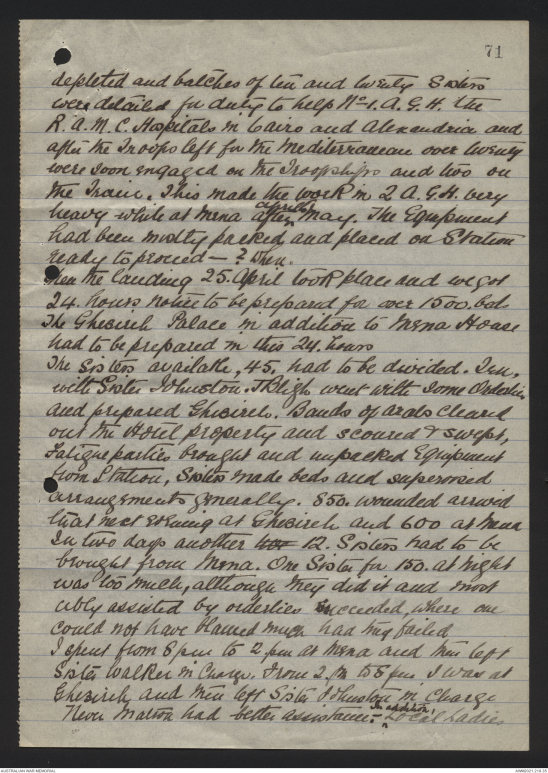
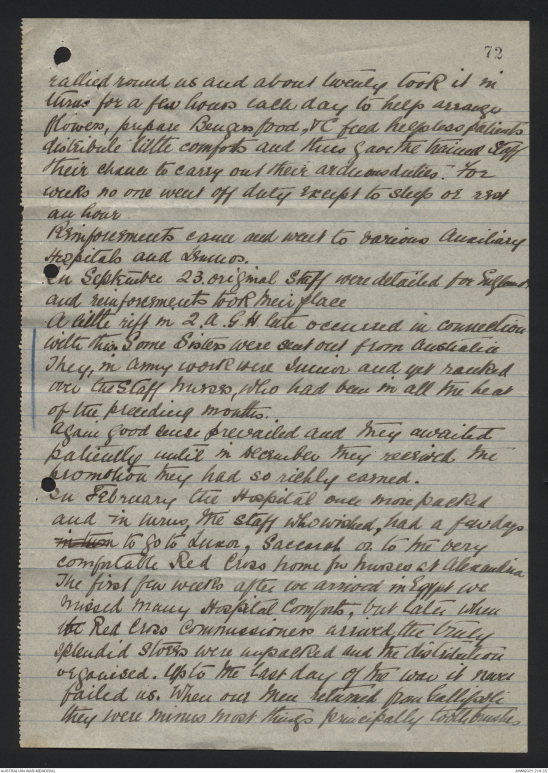
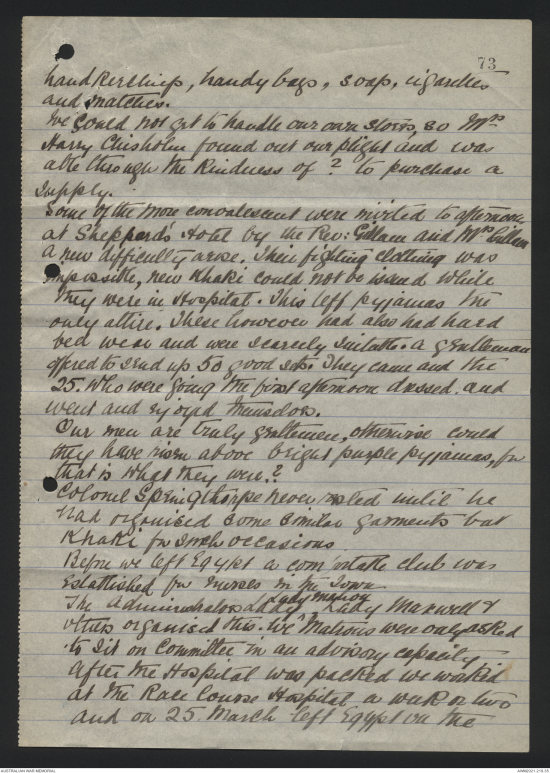
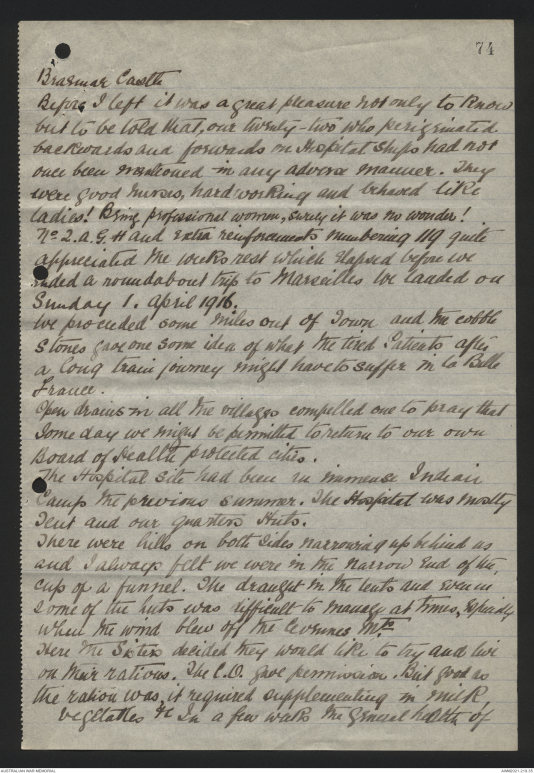
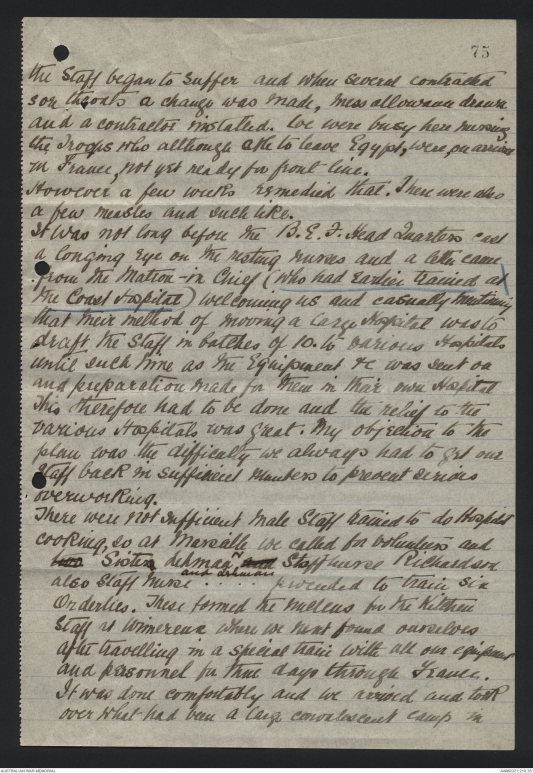
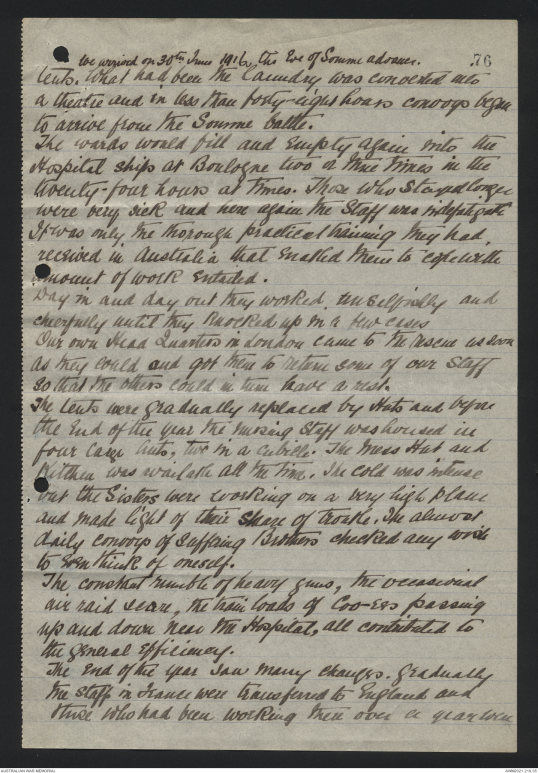
67
When No 6. closed down, we went to Ermelo in the
Eastern Transvaal to No 35. Stationary. It was
a bare hillside at the end of sixty miles of
Block houses. We were nursing the sick from
2000 troops about there. Mostly typhoid and
yellow jaundice. Here we saw the start of seven
columns which took part in the last drive
of the war and here we saw the Boers come in
to surrender arms.
No bitterness on either side.
August.2. 1902 found us landing in Australia
from the Montrose - the Boer War Ended.
Again organisation proceeded apace and all the
states having become one Commonwealth decided
to have one Nursing Service. Our Section ∧ Military District No 2. still
intact, was merged into the present Defence Force A.N.S.
The Lady Superintendent became a Principal Matron
otherwise no change.
The Efficiency Staff in May 1914. was complete
and in addition there were about forty Reserves.
These were all Sisters who had been Efficient one or
more years since 1905.
As soon as war broke out we were sent out notices to all Efficient
and Reserve Sisters asking them whether in the event of
the Nursing Service being required they were prepared
for (a) Home Service (b) Oversea service. That year
Efficients, as was always understood, were to have first
chance. By the second wave in September arrangements
were almost complete and in addition to the Efficient Sisters
and Reserve Efficient Sisters, more than a hundred fully
68
qualified members of the Austr∧alianalasian Trained Nurses
association were eagerly awaiting involvement. Thedraughts re-inforcements continued to come on throughout the war and
and Australian nurses found a very special niche for
themselves among their Khaki Comrades. None better
that the nurses know what the strain has been
on our men of all ranks.
On 29th September 1914. Principal Matron Gould E.J.
Matron Johnston. J Bligh, Sisters Frater P. Killett A.M.,
Twynam I. and the Matron of the Tasmanian
A.A.N.S. who happened to be working on Reserve
in Sydney, the late Miss Walker J. were detailed
for duty on Transport "Euripides"; Sisters Pocock
A.B. and Marshall C for duty on the Troopship
"Argyleshire".
The luggage for this Nursing Staff went on board
on the 28th but owing to delays rendered necessary
by the presence of the Raider Emden, somewhere
in Southern Waters, the Fleet did not leave
until later, 20th October.
Meantime we had to practically disappear
so that our ultimate departure might be unnoticed,
Miss Creal ∧R. took over the duties of Principal Matron
from the 28th September in No 2.Military District
and. very ably did she do it, as witnessed the
thorough way in which all details of equipment
were carried out, as each batch of re-inforcements
came forward.
I cannot speak personally of work in New South
Wales after this, as I left on the Euripides.
69
IV A.A.N.S. with 1st Expeditionary Force
The Senior Staff was detailed to leave first and each
Troopship became in fact a moving Township containing
among other Institutions a small Hospital according
to the number of Troops and the Military Districts, from
which they came. In all there were 25. (Sisters on Fleet).
There were no drones, all took turns in nursing, irrespective
of rank, for influenza and pneumonia accompanied us,
as well as occasional cases of ptomaine poisoning.
There were a few surgical operations who did very
well and waves of inoculations, all requiring some
little attention from Sister.
The Staff took it in turns to do night duty. One only
went on before breakfast and the rest directly after.
The Matron did afternoon duty each day, while the
others rested for two or three hours.
We had two three berth cabins and a Private Sitting
room, which in pre war days was the day nursery.
Our meals we had in the Saloon at a specially
reserved table.
It was a busy ship and consequently a happy one.
On 4th December we arrived at Alexandria and here
they requested a Sister to accompany some few sick
we were leaving there. Sister I. Walker was detailed for
this duty and remained some weeks.
On the evening of 5th we arrived at Mena House a
large tourist Hotel adapted for a Hospital. I found our
frantic 2.A.A.N.S. Sister acting as Matron struggling
to look after eighty Patients. The next morning we
all commenced duty
70
Under the circumstances I decided to help and not
take over any official duties as Matron, until the arrival
of my own Hospital No 2. A.G.H.
I took over the Officers' Wards and one Sister was
detailed to work with me. The other Sisters were
detailed to various wards and the theatre by the
acting Matron.
We were kept busy and so was the huge Training
Camp.
On 20th January the personell of No 2 A.G.H.
arrived. There were 96. Sisters and Staff nurses
(to every Sister two Staff Nurses) for No 2.
Lt Col Martin soon had the Hospital running
like a good ordinary Hospital.
The idea of Staff Nurses was entirely new to
Australia in the Army Nursing service and it is
due to the inate good breeding of the individual
members of our service that we came through
what was really an ordeal for so many
equally qualified nurses, to settle down to
work in the various ranks. Often, a Matron
in Australia, found herself a Staff Nurse in the
Army, under a Sister who had recently left
her training school and perhaps only been a
Sister a year or less.
The Spirit of Service however overcame the
Spirit of Rank and throughout the campaign
continued to do so.
But it was later when our Troops returned wounded
from Gallipoli that the strain came. Our Staff was also
71
depleted and batches of ten and twenty Sisters
were detailed for duty to help No1. A.G.H. the
R.A.M.C. Hospitals in Cairo and Alexandria and
after the Troops left for the Mediterranean over twenty
were soon engaged on the Troopships and two on
the Train. This made the work in 2 A.G.H. very
heavy while at Mena after ∧April /May. The equipment
had been mostly packed and placed on Station
ready to proceed - ? when.
Then the landing 25. April took place and we got
24. hours notice to be prepared for over 1500. beds
The Ghesireh Palace in addition to Mena House
had to be prepared in this 24. hours
The sisters available, 45, had to be divided. Ten,
with Sister Johnston. J Bligh went with some Orderlies
and prepared Ghisireh. Bands of Arabs cleaned
out the Hotel property and scoured and swept,
Fatigue parties brought and unpacked Equipment
from Station, Sisters made beds and supervised
arrangements generally. 850. wounded arrived
that next evening at Ghesirch and 600 at Mena
In two days another 40 12. Sisters had to be
brought from Mena. One sister for 150. at night
was too much, although they did it and most
ably assisted by orderlies succeeded, where one
could not have blamed much had they failed
I spent from 8 pm to 2 pm at Mena and then left
Sister Walker in Charge. From 2. pm to 8 pm I was at
Ghizireh and this left Sister Johnston in Charge
Never Matron had better assistance. - ∧In addition, local ladies
72
rallied round us and about twenty took it in
turns for a few hours each day to help arrange
flowers, prepare Beugers food, VC feed helpless patients
distribute little comforts and thus gave the trained staff
their chance to carry out their arduous duties. For
weeks no one went off duty except to sleep or rest
an hour.
Reinforcements came and went to various Auxiliary
Hospitals and Lemnos.
In September 23. original staff were detailed for England
and reinforcements took their place
A little rift in 2.A.G.H. late occurred in connection
with this. Some Sisters were sent out from Australia
They, in Army work were Junior and yet ranked
over the Staff Nurses, who had been in all the heat
of the preceding months.
Again good sense prevailed and they awaited
patiently until in December they received the
promotion they had so richly earned.
In February the Hospital once more packed
and in turns, the staff who wished, had a few days
in town to go to Luxor, Saccasoh or to the very
comfortable Red Cross home for nurses at Alexandria
The first few weeks after we arrived in Egypt we
missed many Hospital Comforts, but later when
the Red Cross Commissioners arrived the truly
splendid stores were unpacked and the distribution
organised. Up to the last day of the war it never
failed us. When our men returned from Gallipoli
they were minus most things principally toothbrushes
73
handkerchiefs, handy bags, soap, cigarettes
and matches.
We could not get to handle our own stores, so Mrs
Harry Chisholm found out our plight and was
able through the kindness of ? to purchase a
supply.
Some of the most convalescent were invited to afternoon
at Sheppard's Hotel by the Rev: Gillam and Mrs Gillam
A new difficulty arose. Their fighting clothing was
impossible, new khaki could not be issued while
they were in Hospital. This left pyjamas the
only attire. These however had also had hard
bed wear and were scarcely suitable. A gentleman
offered to send up 50 good sets. They came and the
25. who were going the first afternoon dressed. and
went and enjoyed themselves.
Our men are truly gentlemen, otherwise could
they have risen above bright purple pyjamas, for
that is what they were..?
Colonel Springthorpe never rested until he
had organised some similar garments but
Khaki for such occasions.
Before we left Egypt a comfortable club was
established for nurses in the Town.
The administrators Lady ∧Lady Manon, Lady Maxwell &
others organised this. We Matrons were only asked
to sit on Committee in an advisory capacity.
After the Hospital was packed we worked
at the Race Course Hospital a week or two
and on 25.March left Egypt on the
74
Braemar Castle.
Before I left it was a great pleasure not only to know
but to be told that, our twenty-two who peregrinated
backwards and forwards on Hospital Ships had not
once been mentioned in any adverse manner. They
were good nurses, hardworking and behaved like
ladies! Being professional women, surely it was no wonder!
No 2.A.G.H and extra reinforcements numbering 119 quite
appreciated the weeks rest which elapsed before we
ended a roundabout trip to Marseilles We landed on
Sunday 1. April 1916.
We proceeded some miles out of Town and the cobble
stones gave one some idea of what the tired Patients after
a long train journey might have to suffer in La Belle
France.
Open drains in all the villages compelled one to pray that
some day we might be permitted to return to our own
Board of Health protected cities.
The Hospital site had been an immense Indian
Camp the previous summer. The Hospital was mostly
Tent and our quarters Huts.
There were hills on both sides narrowing up behind us
and I always felt we were in the narrow end of the
cup of a funnel. The draught in the tents and even in
some of the huts was difficult to manage at times, especially
when the wind blew off the Cevennes Mts.
There the sisters decided they would like to try and live
on their rations. The C.O. gave permission. But good as
the ration was, it required supplementing in milk,
vegetables &c In a few weeks the general health of
75
the staff began to suffer and when several contracted
sore throats a change was made, mess allowance drawn
and a contractor installed. We were busy here nursing
the Troops who although able to leave Egypt, were, on arrival
in France, not yet ready for front line.
However a few weeks remedied that. There were also
a few measles and such like.
It was not long before the B.E.F. Head Quarters cast
a longing eye on the resting nurses and a letter came
from the Matron-in Chief (who had earlier trained at
the Coast Hospital) welcoming us and casually mentioning
that their method of moving a large Hospital was to
draft the Staff in batches of 10. to various Hospitals
until such time as the Equipment &c was sent on
and preparation made for them in their own Hospital.
This therefore had to be done and the relief to the
various Hospitals was great. My objection to the
plan was the difficulty we always had to get our
Staff back in sufficient numbers to prevent serious
overworking.
There were not sufficient male staff trained to do Hospital
cooking, so at Marseille we called for volunteers and
two Sisters Lehman N, and Staff Nurse Richardson
also Staff Nurse and Lehman.... proceeded to train six
Orderlies. These formed the nucleus for the Kitchen
Staff at Wimereux where we next found ourselves
after travelling in a special train with all our equipment
and personnel for three days through France.
It was done comfortably and we arrived and took
over what had been a large convalescent camp in
76
tents. We arrived on 30th June 1916, the Eve of Somme advances.
What had been the laundry was converted into
a theatre and in less than forty-eight hours convoys began
to arrive from the Somme battle.
The wards would fill and empty again into the
Hospital ship at Boulogne two or three times in the
twenty-four hours at times. Those who stayed longer
were very sick and here again the Staff was indefatigable.
It was only the thorough practical training they had,
received in Australia that enabled them to cope with the
amount of work entailed.
Day in and day out they worked, unselfishly and
cheerfully until they knocked up in a few cases.
Our own Head Quarters in London came to the rescue as soon
as they could and got them to return some of our staff
so that the others could in time have a rest.
The tents were gradually replaced by huts and before
the end of the year the Nursing Staff was housed in
four large huts, two in a cubicle. The Mess Hut and
Kitchen was available all the time. The cold was intense
but the Sisters were working on a very high plane
and made light of their share of trouble. The almost
daily convoys of suffering Brothers checked any wish
to soon think of oneself.
The constant rumble of heavy guns, the occasional
air raid scare, the train loads of Coo-ees passing
up and down near the Hospital, all contributed to
the general efficiency.
The end of the year saw many changes. Gradually
the staff in France were transferred to England and
those who had been working there over a year were
 Sam scott
Sam scottThis transcription item is now locked to you for editing. To release the lock either Save your changes or Cancel.
This lock will be automatically released after 60 minutes of inactivity.